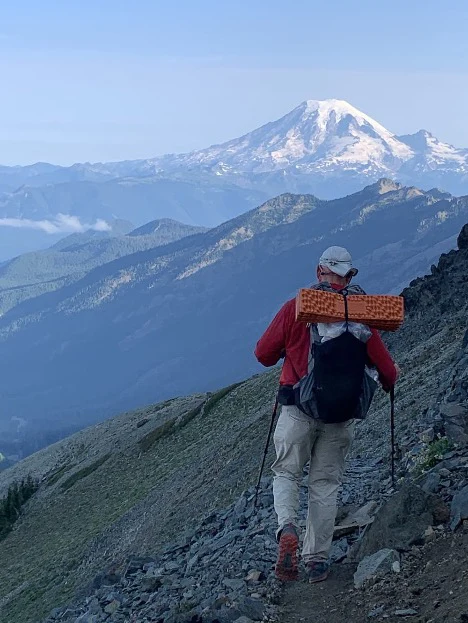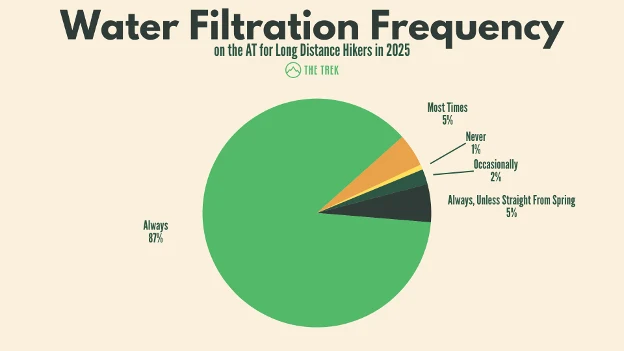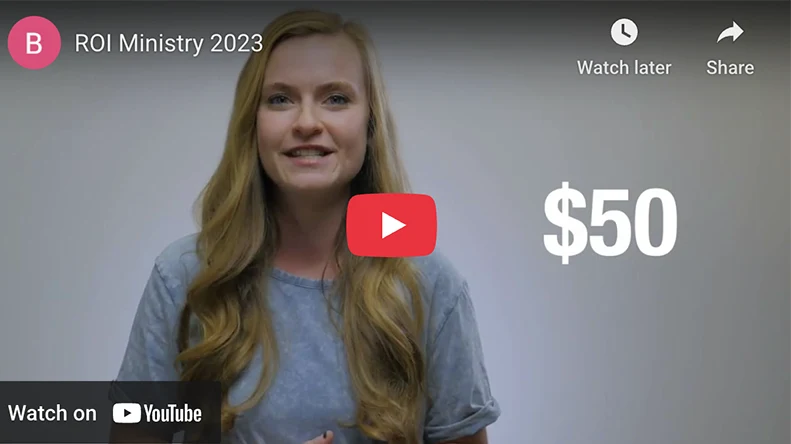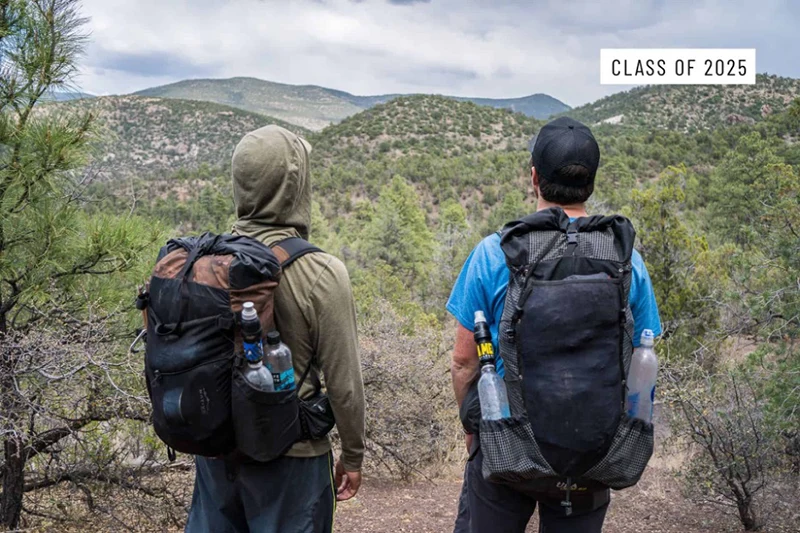Walking into Confidence
Walking into Confidence

Walking into Confidence
YouTube video highlight
Thru-hiking is a double-edged sword in Bailey's life - one that both empowers and afflicts her with comparisonitis. Here's how she stays grounded.
Read more about the projectA woof sounded in the dusk as my two dogs alerted me to a stranger. In the gloom, a hiker with a small backpack went striding by, hardly pausing as they continued. Watching them walk away, I felt an all too familiar feeling: insecurity.
The visibly smaller pack and the fact that this hiker must be doing bigger miles to be walking at dusk made me feel inadequate by comparison.
Logically, I knew these emotions were rather silly given that I had been hiking daily for over four months, all the way from Canada on my own route. Unfortunately, emotions don't always listen to logic.

Fragile Roots
As someone who spends a significant number of days walking every year, I have had a lot of time to consider why I often feel insecure in the outdoors. Many of the feelings I have struggled with as an adult stem from my days as an awkward middle schooler.

Back then, I was incredibly independent but also very self-conscious about my acne, small friend group, and poor fashion sense. While outwardly, I didn’t seem to care and often embraced my nerdy-ness, I often felt like I wasn’t good enough. This insecurity was only compounded by the competitive nature of the school I attended, be it grades, sports, or performing arts.
I was never the best at anything and felt as though I never would be.
Fortunately, I kept my head down and focused on my hopes and dreams.

As I became more involved in activities such as 4-H my confidence grew, especially heading into college. I started venturing outdoors more and did things on my own.
It was around this time that I really started to prioritize hiking and soon after graduating, I tackled my first thru-hike on the Colorado Trail.
On-Trail Identity Crisis
Initially, I was so focused on going through the basic motions necessary for backpacking that I didn’t pay too much attention to those around me. I was conscious that others were hiking faster than me, but I took zeros when I wanted, regardless of what others were doing.

Over time, I began to feel more self-conscious: am I going slower than others? What is my pack weight like? Is my hike hard enough? And so on.
Slowly but surely, thru-hiking became a bigger part of my identity.
Originally, the 485-mile Colorado Trail was to be a one-and-done affair before moving on with my life. However, like many others before me, I caught the bug and have prioritized thru-hikes ever since.

The Pressure to Perform
Thru-hiking as an identity has been a double-edged sword in my life. On one hand, it has helped create a large dose of confidence.
For the first time in my life, I felt athletic and strong, like I had finally shed away the awkward teenager that still lurked in my shadow.
On the flip side, I got a taste of the challenge and wanted to prove myself further by showing that I could be the best at something.

As I have met more hikers and spent more time outside, a war has ensued. On one side, I have met hikers whom I greatly respect and who are incredibly humble and down to earth. Talking with them is a pleasure and I learn much. I have tried my best to emulate them, and they’ve inspired the part of me that truly loves spending time outdoors.
Paired with my desire to be the best, this means that when I see or talk to other hikers who are faster, lighter, or more accomplished - it can lead to a feeling of inadequacy and comparison-itis.
On the other hand, I rarely offer up information on what trails I’ve hiked and have gone through phases where I didn’t use social media at all. I like living in the shadows and am generally happier there.
Fighting Back

As mentioned, the hermit Bailey who focuses on staying humble is generally happier. As such, there are some strategies I have developed for combating my insecurity in the outdoors.
- Limit Social Media Use: While I will occasionally use social media, I tend to use it a fair bit less than other hikers. Even though I love to keep up with my friends, it also provides an abundance of opportunities to compare myself to others.
- Build Meaningful Relationships: Surrounding myself with hikers who have similar goals and values has been huge. Many of my friends are humble and focus on themselves more than the people around them which makes it easier to do the same.
- Avoid Peer Pressure: It can be tough, but fighting the urge to go on adventures just to impress others has helped me not to get burnt out in the outdoors. I have many friends who have completed the Triple Crown, but it is not something I am interested in doing anytime soon. There is certainly some self-inflicted pressure, but I recognize that it is just because I want the bragging rights. Instead, I have focused on trails that pique my interest and give me something to be excited about when saving over the winter.
- Be Mindful: When feelings of insecurity emerge, I take time to feel them, and then evaluate why I am feeling that way. It doesn’t always make the sensation stop, but I do think about it logically and try to remind myself of all the reasons it is not productive to play the comparison game.

Spending time outdoors has provided some of the biggest highlights of my life so far. There is nowhere I would rather be than out on the trail. Thus, it is important to me to try to keep my time outside as positive as possible and prevent my insecurities from ruining things.
I hope that if others are struggling with the same feelings, this can be a lesson that many people of all experience levels can utilize.
Walking into Confidence


A woof sounded in the dusk as my two dogs alerted me to a stranger. In the gloom, a hiker with a small backpack went striding by, hardly pausing as they continued. Watching them walk away, I felt an all too familiar feeling: insecurity.
The visibly smaller pack and the fact that this hiker must be doing bigger miles to be walking at dusk made me feel inadequate by comparison.
Logically, I knew these emotions were rather silly given that I had been hiking daily for over four months, all the way from Canada on my own route. Unfortunately, emotions don't always listen to logic.

Fragile Roots
As someone who spends a significant number of days walking every year, I have had a lot of time to consider why I often feel insecure in the outdoors. Many of the feelings I have struggled with as an adult stem from my days as an awkward middle schooler.

Back then, I was incredibly independent but also very self-conscious about my acne, small friend group, and poor fashion sense. While outwardly, I didn’t seem to care and often embraced my nerdy-ness, I often felt like I wasn’t good enough. This insecurity was only compounded by the competitive nature of the school I attended, be it grades, sports, or performing arts.
I was never the best at anything and felt as though I never would be.
Fortunately, I kept my head down and focused on my hopes and dreams.

As I became more involved in activities such as 4-H my confidence grew, especially heading into college. I started venturing outdoors more and did things on my own.
It was around this time that I really started to prioritize hiking and soon after graduating, I tackled my first thru-hike on the Colorado Trail.
On-Trail Identity Crisis
Initially, I was so focused on going through the basic motions necessary for backpacking that I didn’t pay too much attention to those around me. I was conscious that others were hiking faster than me, but I took zeros when I wanted, regardless of what others were doing.

Over time, I began to feel more self-conscious: am I going slower than others? What is my pack weight like? Is my hike hard enough? And so on.
Slowly but surely, thru-hiking became a bigger part of my identity.
Originally, the 485-mile Colorado Trail was to be a one-and-done affair before moving on with my life. However, like many others before me, I caught the bug and have prioritized thru-hikes ever since.

The Pressure to Perform
Thru-hiking as an identity has been a double-edged sword in my life. On one hand, it has helped create a large dose of confidence.
For the first time in my life, I felt athletic and strong, like I had finally shed away the awkward teenager that still lurked in my shadow.
On the flip side, I got a taste of the challenge and wanted to prove myself further by showing that I could be the best at something.

As I have met more hikers and spent more time outside, a war has ensued. On one side, I have met hikers whom I greatly respect and who are incredibly humble and down to earth. Talking with them is a pleasure and I learn much. I have tried my best to emulate them, and they’ve inspired the part of me that truly loves spending time outdoors.
Paired with my desire to be the best, this means that when I see or talk to other hikers who are faster, lighter, or more accomplished - it can lead to a feeling of inadequacy and comparison-itis.
On the other hand, I rarely offer up information on what trails I’ve hiked and have gone through phases where I didn’t use social media at all. I like living in the shadows and am generally happier there.
Fighting Back

As mentioned, the hermit Bailey who focuses on staying humble is generally happier. As such, there are some strategies I have developed for combating my insecurity in the outdoors.
- Limit Social Media Use: While I will occasionally use social media, I tend to use it a fair bit less than other hikers. Even though I love to keep up with my friends, it also provides an abundance of opportunities to compare myself to others.
- Build Meaningful Relationships: Surrounding myself with hikers who have similar goals and values has been huge. Many of my friends are humble and focus on themselves more than the people around them which makes it easier to do the same.
- Avoid Peer Pressure: It can be tough, but fighting the urge to go on adventures just to impress others has helped me not to get burnt out in the outdoors. I have many friends who have completed the Triple Crown, but it is not something I am interested in doing anytime soon. There is certainly some self-inflicted pressure, but I recognize that it is just because I want the bragging rights. Instead, I have focused on trails that pique my interest and give me something to be excited about when saving over the winter.
- Be Mindful: When feelings of insecurity emerge, I take time to feel them, and then evaluate why I am feeling that way. It doesn’t always make the sensation stop, but I do think about it logically and try to remind myself of all the reasons it is not productive to play the comparison game.

Spending time outdoors has provided some of the biggest highlights of my life so far. There is nowhere I would rather be than out on the trail. Thus, it is important to me to try to keep my time outside as positive as possible and prevent my insecurities from ruining things.
I hope that if others are struggling with the same feelings, this can be a lesson that many people of all experience levels can utilize.
Walking into Confidence


A woof sounded in the dusk as my two dogs alerted me to a stranger. In the gloom, a hiker with a small backpack went striding by, hardly pausing as they continued. Watching them walk away, I felt an all too familiar feeling: insecurity.
The visibly smaller pack and the fact that this hiker must be doing bigger miles to be walking at dusk made me feel inadequate by comparison.
Logically, I knew these emotions were rather silly given that I had been hiking daily for over four months, all the way from Canada on my own route. Unfortunately, emotions don't always listen to logic.

Fragile Roots
As someone who spends a significant number of days walking every year, I have had a lot of time to consider why I often feel insecure in the outdoors. Many of the feelings I have struggled with as an adult stem from my days as an awkward middle schooler.

Back then, I was incredibly independent but also very self-conscious about my acne, small friend group, and poor fashion sense. While outwardly, I didn’t seem to care and often embraced my nerdy-ness, I often felt like I wasn’t good enough. This insecurity was only compounded by the competitive nature of the school I attended, be it grades, sports, or performing arts.
I was never the best at anything and felt as though I never would be.
Fortunately, I kept my head down and focused on my hopes and dreams.

As I became more involved in activities such as 4-H my confidence grew, especially heading into college. I started venturing outdoors more and did things on my own.
It was around this time that I really started to prioritize hiking and soon after graduating, I tackled my first thru-hike on the Colorado Trail.
On-Trail Identity Crisis
Initially, I was so focused on going through the basic motions necessary for backpacking that I didn’t pay too much attention to those around me. I was conscious that others were hiking faster than me, but I took zeros when I wanted, regardless of what others were doing.

Over time, I began to feel more self-conscious: am I going slower than others? What is my pack weight like? Is my hike hard enough? And so on.
Slowly but surely, thru-hiking became a bigger part of my identity.
Originally, the 485-mile Colorado Trail was to be a one-and-done affair before moving on with my life. However, like many others before me, I caught the bug and have prioritized thru-hikes ever since.

The Pressure to Perform
Thru-hiking as an identity has been a double-edged sword in my life. On one hand, it has helped create a large dose of confidence.
For the first time in my life, I felt athletic and strong, like I had finally shed away the awkward teenager that still lurked in my shadow.
On the flip side, I got a taste of the challenge and wanted to prove myself further by showing that I could be the best at something.

As I have met more hikers and spent more time outside, a war has ensued. On one side, I have met hikers whom I greatly respect and who are incredibly humble and down to earth. Talking with them is a pleasure and I learn much. I have tried my best to emulate them, and they’ve inspired the part of me that truly loves spending time outdoors.
Paired with my desire to be the best, this means that when I see or talk to other hikers who are faster, lighter, or more accomplished - it can lead to a feeling of inadequacy and comparison-itis.
On the other hand, I rarely offer up information on what trails I’ve hiked and have gone through phases where I didn’t use social media at all. I like living in the shadows and am generally happier there.
Fighting Back

As mentioned, the hermit Bailey who focuses on staying humble is generally happier. As such, there are some strategies I have developed for combating my insecurity in the outdoors.
- Limit Social Media Use: While I will occasionally use social media, I tend to use it a fair bit less than other hikers. Even though I love to keep up with my friends, it also provides an abundance of opportunities to compare myself to others.
- Build Meaningful Relationships: Surrounding myself with hikers who have similar goals and values has been huge. Many of my friends are humble and focus on themselves more than the people around them which makes it easier to do the same.
- Avoid Peer Pressure: It can be tough, but fighting the urge to go on adventures just to impress others has helped me not to get burnt out in the outdoors. I have many friends who have completed the Triple Crown, but it is not something I am interested in doing anytime soon. There is certainly some self-inflicted pressure, but I recognize that it is just because I want the bragging rights. Instead, I have focused on trails that pique my interest and give me something to be excited about when saving over the winter.
- Be Mindful: When feelings of insecurity emerge, I take time to feel them, and then evaluate why I am feeling that way. It doesn’t always make the sensation stop, but I do think about it logically and try to remind myself of all the reasons it is not productive to play the comparison game.

Spending time outdoors has provided some of the biggest highlights of my life so far. There is nowhere I would rather be than out on the trail. Thus, it is important to me to try to keep my time outside as positive as possible and prevent my insecurities from ruining things.
I hope that if others are struggling with the same feelings, this can be a lesson that many people of all experience levels can utilize.
























































































































